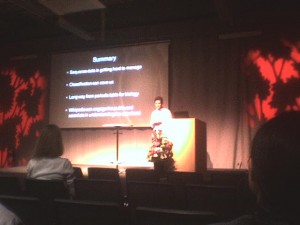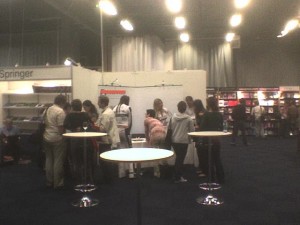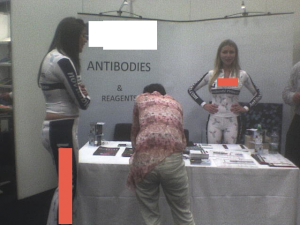Talk, talk, talk…
For those of you who are not already fed up with my writings on biology stuff on the web site, two opportunities to hear me talk in real life has popped up in May. The first is already on May 2nd, on the Open Day in Life Sciences, arranged by the Science Faculty at the University of Gothenburg. I will talk about the search for detoxification systems in metagenomic sequence data (from a collections point of view, as that is the theme for the day). There will also be an opportunity be guided in the herbarium and the botanical garden, plus having lunch and an optional after-work drink at Botaniska Paviljongen. But hurry, last day of admission is tomorrow! Register here.
The second opportunity will be at the SocBiN-2011 bioinformatics conference in Helsinki, on the 12th of May. I will present in the session called “Bioinformatics of Metagenomics”, and talk about a software tool for rRNA classification. I really look forward to this Bioinformatics conference, there are a number of highly prominent and interesting speakers, and I have heard that Helsinki in May is very beautiful. Besides, I am going there with extremely nice people, adding up to potentially being the best biology venue I will attend this spring.
Open Science Summit
There’s a lot of stuff going on at the moment, and I will not be able to make it to this event myself, but I encourage everyone interested in the future of science that is able to to go there. It is important, interesting, and not expensive. Copy/paste from the website:
Join us at the first Open Science Summit, an attempt to gather all stakeholders who want to liberate our scientific and technological commons to enable an new era of decentralized, distributed innovation to solve humanity’s greatest challenges. (…) The Open Science Summit is the first and only event to consider what happens throughout the entire innovation chain as reform in one area influences the prospects in others.
Tickets are available until Wednesday (the 28th), and the event runs from July 29 to 31 at the International House Berkeley, CA. Please be there for me and represent a movement towards increased openness in science. See this previous post by me for my opinion on things.
Useful links:
A future system for publications?
 I listened to a great talk by Alex Bateman (one of the guys behind Pfam and Rfam, as well as involved in HMMER development) at FEBS yesterday. In addition to talking about the problems of increasing sequence amounts, Alex also provided some reflections on co-operativity and knowledge-sharing – not only among fellow researchers, but also to a wider audience. The starting point of this discussion is Rfam, where the annotation of RNA families is entirely based on a community-driven wiki, tightly integrated with Wikipedia. This means that to make a change in the Rfam annotation, the same change is also made at the corresponding Wikipedia page for this RNA family. And what’s the use of this? Well, as Alex says, for most of the keywords in molecular biology (and I would guess in all of science), the top hit on Google will be a Wikipedia entry. If not, the Wikipedia entry will be in the top ten list of hits, if a good Wiki page exists. This means that Wikipedia is the primary source of scientific information for the general public, as well as many scientists. Wikipedia – not scientific journals.
I listened to a great talk by Alex Bateman (one of the guys behind Pfam and Rfam, as well as involved in HMMER development) at FEBS yesterday. In addition to talking about the problems of increasing sequence amounts, Alex also provided some reflections on co-operativity and knowledge-sharing – not only among fellow researchers, but also to a wider audience. The starting point of this discussion is Rfam, where the annotation of RNA families is entirely based on a community-driven wiki, tightly integrated with Wikipedia. This means that to make a change in the Rfam annotation, the same change is also made at the corresponding Wikipedia page for this RNA family. And what’s the use of this? Well, as Alex says, for most of the keywords in molecular biology (and I would guess in all of science), the top hit on Google will be a Wikipedia entry. If not, the Wikipedia entry will be in the top ten list of hits, if a good Wiki page exists. This means that Wikipedia is the primary source of scientific information for the general public, as well as many scientists. Wikipedia – not scientific journals.
The consequence of this is that to communicate your research subject, you should contribute to its Wikipedia page. In fact, Bateman argues, we have a responsibility as scientists to provide accurate and correct information to the public through the best sources available, which in most cases would be Wikipedia. To put this in perspective (and here I once again borrow Alex’ words), if somebody told you ten years ago that there would be one single internet site that everybody would visit to find scientific information, and where discussion and continuous improvement would be allowed, encouraged and performed, most people would have said that was too good to be true. But that’s what Wikipedia offers. It is time to get rid of the Wiki-sceptisism, and start improving it.
And so, what about the future of publishing? Bateman has worked hard to form an agreement with the journal RNA Biology to integrate the publishing into the process of adding to the easily accessible public information. To have an article on a new RNA family published under the journal’s RNA families track, the family must not only be submitted to the Rfam database, but the authors must also provide a Wikipedia formatted article, which undergo the same peer-review process as the journal article. This ensures high-quality Wikipedia material, as well as making new scientific discoveries public.
I don’t think there’s a long stretch to guess that in the future, more journals and/or funding agencies will take on similar approaches, as researchers and decision-makers discover the importance of correct, publicly available information. The scientific world is slowly moving towards being more open, also for non-scientists. This openness is of extremely high importance in these times of climate scepticism, GMO controversy, extinction of species, and nuclear power debate. For the public to make proper decisions and send a clear message to the politicians, scientists need to be much better at communicating the current state of knowledge, or what many people prefer to call “truth”.
Sex sells – even in biology
Here at FEBS, I am for the first time doing the reflection that sex obviously can sell anything – even biology. With a mixture of disgust and interest of how much more attention it actually brings, I have been watching the two “antibody princess” girls that’s been running around at the conference, trying to sell antibodies. Unfortunately, I have not brought my camera, so all I have is these pretty bad pictures taken with my phone. I will not name the company behind this, as I do not want to function as an inappropriate extra advertising space for them, but it’s interesting to note that the “sex sells” thing has reached into molecular biology. And it makes me wonder what’s next…
FEBS Workshop: Last Chance
The time is running out if you want to attend to the workshop session on mapping signal transduction, hosted by Stefan Hohmann and Marcus Krantz, which I will take part in. Deadline is on the 15 of May, so register soon if you have not already done. You can find all important info here.
The workshop will take place on June 29:th, between 13.00 and 15.30. The goal is to show some visualisation strategies for signal transduction pathways, and how to use pathway maps as a base to create mathematical models. There will be a brief introduction to mapping and modelling and to the software used (Cytoscape, CellDesigner). This will be followed by independent work with a set of small case studies that demonstrates the basic methodology. I will take part in answering questions and assisting during the case study part.

